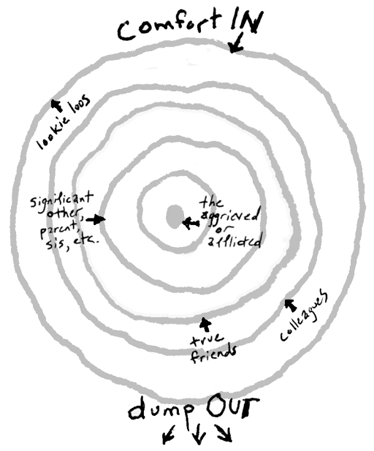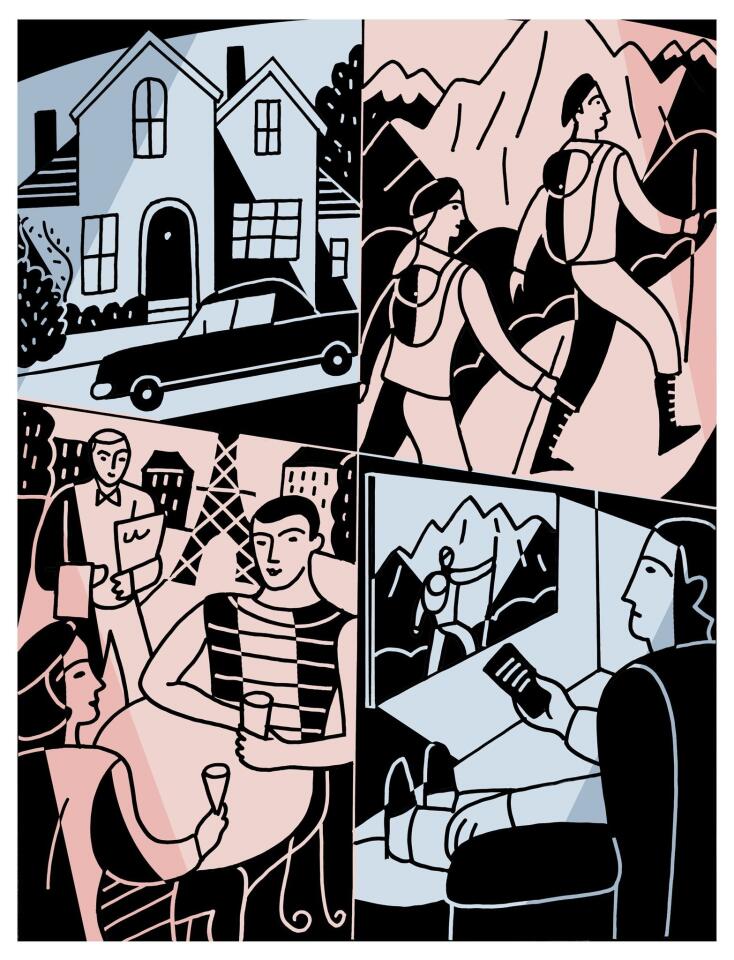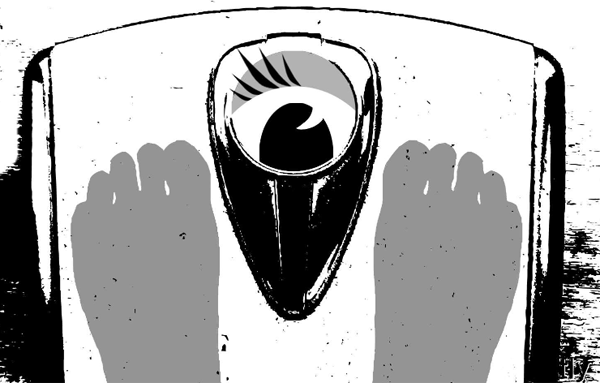10 tips for a better life from The Times’ Op-Ed pages in 2013

Susan Silk and Barry Goldman explained the “ring theory” of kvetching in an April Op-Ed article that included a diagram and simple rules for not saying the wrong thing:
“The person in the center ring can say anything she wants to anyone, anywhere. She can kvetch and complain and whine and moan and curse the heavens and say, ‘Life is unfair’ and ‘Why me?’ That’s the one payoff for being in the center ring. Everyone else can say those things too, but only to people in larger rings.”
They also offered this wisdom:
“Listening is often more helpful than talking.”
RELATED:
Ted Rall’s five best cartoons of 2013
2013 endings: Columnist Patt Morrison on what she won’t miss
Paul Walker and six other inspirational people who died too soon (Wes Bausmith / Los Angeles Times )
It’s not all politics and policy on The Times’ Op-Ed pages. The section also dispenses advice on happiness, relationships and health, and it offers lessons for how to live a better life. Here’s a look back at the Op-Ed articles that resonated most with readers. -- Alexandra Le Tellier
Follow Alexandra Le Tellier on Twitter @alexletellier and Google+

Forget diligently saving for a house or placing too much value on material things, argued Elizabeth Dunn and Michael Norton in a May Op-Ed. Research shows that spending money on experiences and doing things for other people are the key ingredients for a happier life. Their bottom line:
“How we use our money may matter as much or more than how much of it we’ve got.”
RELATED:
Ted Rall’s five best cartoons of 2013
2013 endings: Columnist Patt Morrison on what she won’t miss
Paul Walker and six other inspirational people who died too soon (Anthony Russo / For The Times)

In September, Washington columnist Doyle McManus wrote about how a demon iPad stole his summer vacation. “Instead of browsing dog-eared summer-house mystery novels and bodice rippers, this year we browsed the Internet,” he lamented. “Instead of long evenings of Scrabble or Monopoly or poker, we checked our Twitter feeds and updated our Facebook pages.” Lessons learned:
“It’s important not to let the convenience of the Internet get in the way of simpler beauties. That’s not the Internet’s fault. It’s ours, for failing to curb the urge to browse.”
RELATED:
Ted Rall’s five best cartoons of 2013
2013 endings: Columnist Patt Morrison on what she won’t miss
Paul Walker and six other inspirational people who died too soon (Marcio Jose Sanchez / Associated Press)

Patients in Los Angeles are increasingly demanding more medical services from their doctors, wrote Daniel J. Stone in a March Op-Ed: “Angelenos approach healthcare as they do other kinds of consumption. They expect their CT scans, when they want them, in much the same way they expect their decaf caramel extra hot low-fat macchiatos. Think of it as the Starbucks syndrome in healthcare.”
Trouble is, he said, the “ ‘more is better’ approach to healthcare ... adds cost without necessarily leading to better outcomes.”
Instead, he recommends choosing wisely. His prescription to both doctors and patients:
“A joint initiative of Consumer Reports and the American Board of Internal Medicine, the program is aimed at encouraging both physicians and patients to carefully consider the wisdom of medical procedures. The program asks each of 25 medical sub-specialty societies to identify five commonly used tests or procedures that both patients and their doctors should question. When such procedures and tests are done without need, they are not just a waste of money; in some cases they may subject patients to additional risk without the potential to improve their health.”
RELATED:
Ted Rall’s five best cartoons of 2013
2013 endings: Columnist Patt Morrison on what she won’t miss
Paul Walker and six other inspirational people who died too soon (Peter and Maria Hoey / For The Times )
Advertisement

In an August Op-Ed, Aaron Rosen argued that students should consider attending college in Europe. His four smart reasons:
1. “The admissions process in America has become a mutant version of ‘The Hunger Games,’ in which students grapple against their peers for a single spot in a liberal arts college, convinced by parents and guidance counselors that their survival rests on playing one more musical instrument or varsity sport.”
2. “Students applying outside the U.S. not only bypass this rat race, they also radically increase their chances of getting into a better university. Instead of jostling for places at mid-range American universities, which now have the luxury of admitting fewer and fewer students, applicants can apply to top-flight European institutions as a coveted international student.”
3. “Perhaps most important, universities abroad can be dramatically more affordable than private colleges in America. A typical top-tier U.S. liberal arts college costs about $55,000 to $60,000 a year, including room and board. Even taking into account the increased cost of living and higher tuition rate for non-European Union students, American students would pay roughly $25,000 less a year to attend a university of equivalent stature in Britain. And students can still avail themselves of U.S. federal loans, even while studying outside the U.S.”
4. “The real kicker is that most British bachelor’s degrees typically require only three years instead of four for graduation, saving both time and money. Without financial assistance, the cumulative savings for a British versus American bachelor’s degree then leaps to about $130,000.”
RELATED:
Ted Rall’s five best cartoons of 2013
2013 endings: Columnist Patt Morrison on what she won’t miss
Paul Walker and six other inspirational people who died too soon (Christopher Serra / For The Times)

Our lives have become too cluttered, taken over by physical and virtual mess, argued Howard Mansfield in a September Op-Ed. “Clutter is the cholesterol of the home; it’s clogging the hearth,” he wrote. His tidy tip:
“Ignore the decluttering gurus who pile step upon step. Don’t clutter your life with preparation and endless lists. Take this advice from the decluttering coach who calls herself ‘FlyLady’: Grab 27 things and remove them. Repeat. What’s keeping you from living? Throw it all away, step over it, push it into a corner, into the garage, barn, storage shed. Mice, rats, mold, mildew will have their way. Just go live your life.”
RELATED:
Ted Rall’s five best cartoons of 2013
2013 endings: Columnist Patt Morrison on what she won’t miss
Paul Walker and six other inspirational people who died too soon (Anthony Russo / For The Times)

Instead of solely focusing on college rankings, Barry Glassner and Morton Schapiro advised students (and their parents) to think about different criteria when deciding which college to attend. “Consider where you will thrive, both in the near term and after you graduate,” they wrote in an August Op-Ed. Their professor wisdom:
“In the end, the payoff will be greater. After all, the goal is to develop the skills and the inclination to educate yourself for life.”
RELATED:
Ted Rall’s five best cartoons of 2013
2013 endings: Columnist Patt Morrison on what she won’t miss
Paul Walker and six other inspirational people who died too soon (Jacquelyn Martin / Associated Press)

Are Americans obsessed with weight loss because we’re seeking better health or avoiding weight discrimination? “Fear and loathing of fat are real, and American attitudes about fat may be more dangerous to public health than obesity itself,” argued Abigail Saguy in a January Op-Ed that described the many ways heavier women are discriminated against. Saguy’s food for thought:
“This year, before embarking on yet another diet, ask yourself why you want to lose weight. If it is to improve your health, perhaps you should focus on health-enhancing behaviors that are more directly linked to health: Pledge, for example, to get more sleep, eat more fruits and vegetables, get regular physical activity, or spend more time with friends.
“But if you are trying to change your body to shield against discrimination and stigma, consider making a different kind of New Year’s resolution: to stand up to intolerance and bigotry in all its various forms, whether racism, sexism or fatphobia.”
RELATED:
Ted Rall’s five best cartoons of 2013
2013 endings: Columnist Patt Morrison on what she won’t miss
Paul Walker and six other inspirational people who died too soon (Wes Bausmith / Los Angeles Times)







